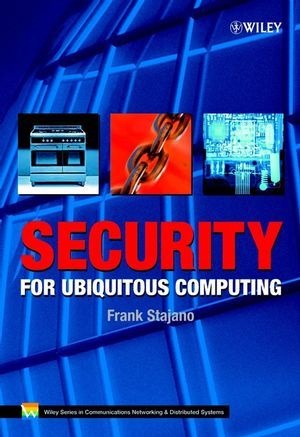Read more
Informationen zum Autor Frank Stajano is the author of Security for Ubiquitous Computing , published by Wiley. Klappentext Ubiquitous computing (ubicomp) is about networked microprocessors embedded in everyday objects: not just cellphones and home appliances but also books, bookshelves, bus stops and bathtubs. This future is closer than you might imagine. The insecurity of networked PCs is notorious. If we deployed ubicomp systems as vulnerable as PCs, the risks for society would be catastrophic. How can we do better, and what are the new problems? In a very accessible style, this book provides a coherent framework to make sense of the many issues at stake. Features include: * An introduction to the state of the art in ubicomp research. * A readable primer on security and cryptology. * An up-to-date technical treatment of ubicomp security, including a sceptical look at Bluetooth and 802.11. * "Peer-to-peer" and ad-hoc networking. * An in-depth discussion of specific, cutting-edge solutions. * An extensively annotated bibliography. Security for Ubiquitous Computing combines clarity, brevity and authority. It will appeal to developers and researchers in ubiquitous computing, wireless and ad-hoc networking, wearable computing and related areas. Because it is readable and self-contained, it will also prove valuable to managers, analysts, technology watchers and end users who want to understand the new opportunities and risks of ubicomp. Zusammenfassung Ubiquitous computing is about distributed systems with a difference. It is about hundreds and thousands of computers embedded in everyday devices (such as phones, washing machines, TVs, heating sytems, smartcards, etc) communicating with each other over ad--hoc wireless networks. Inhaltsverzeichnis About the Author. Forward. Preface. Acknowledgements. Contact Information. 1. Introduction. Scenario. Essential terminology. Problems. Notation. 2. Ubiquitous computing. Xerox PARC. Norman's Invisible Computer. MIT. HP's Cooltown. ORL/AT&T Labs Cambridge. Security issues. 3. Computer security. Confidentiality. Integrity. Availability. Authentication. Security policies. 4. Authentication. New preconditions. The Resurrecting Duckling security policy model. The many ways of being a master. 5. Confidentiality. Cryptographic primitives for peanut processors. Personal privacy. 6. Integrity. Message integrity. Device integrity. 7. Availability. Threats to the communications channel. Threats to the battery energy. Threats from mobile code. 8. Anonymity. The Cocaine Auction Protocol. The anonymity layer. 9. Conclusions. Appendix A: A Short Primer on Functions. Appendix B: Existing Network Security Solutions. Annotated bibliography. Index....
List of contents
About the Author.
Forward.
Preface.
Acknowledgements.
Contact Information.
1. Introduction.
Scenario.
Essential terminology.
Problems.
Notation.
2. Ubiquitous computing.
Xerox PARC.
Norman's Invisible Computer.
MIT.
HP's Cooltown.
ORL/AT&T Labs Cambridge.
Security issues.
3. Computer security.
Confidentiality.
Integrity.
Availability.
Authentication.
Security policies.
4. Authentication.
New preconditions.
The Resurrecting Duckling security policy model.
The many ways of being a master.
5. Confidentiality.
Cryptographic primitives for peanut processors.
Personal privacy.
6. Integrity.
Message integrity.
Device integrity.
7. Availability.
Threats to the communications channel.
Threats to the battery energy.
Threats from mobile code.
8. Anonymity.
The Cocaine Auction Protocol.
The anonymity layer.
9. Conclusions.
Appendix A: A Short Primer on Functions.
Appendix B: Existing Network Security Solutions.
Annotated bibliography.
Index.
Report
"...a remarkably readable introduction to the topic...rich in background material." ( IEEE Network , New Books & Multimedia Column, November 2002)

